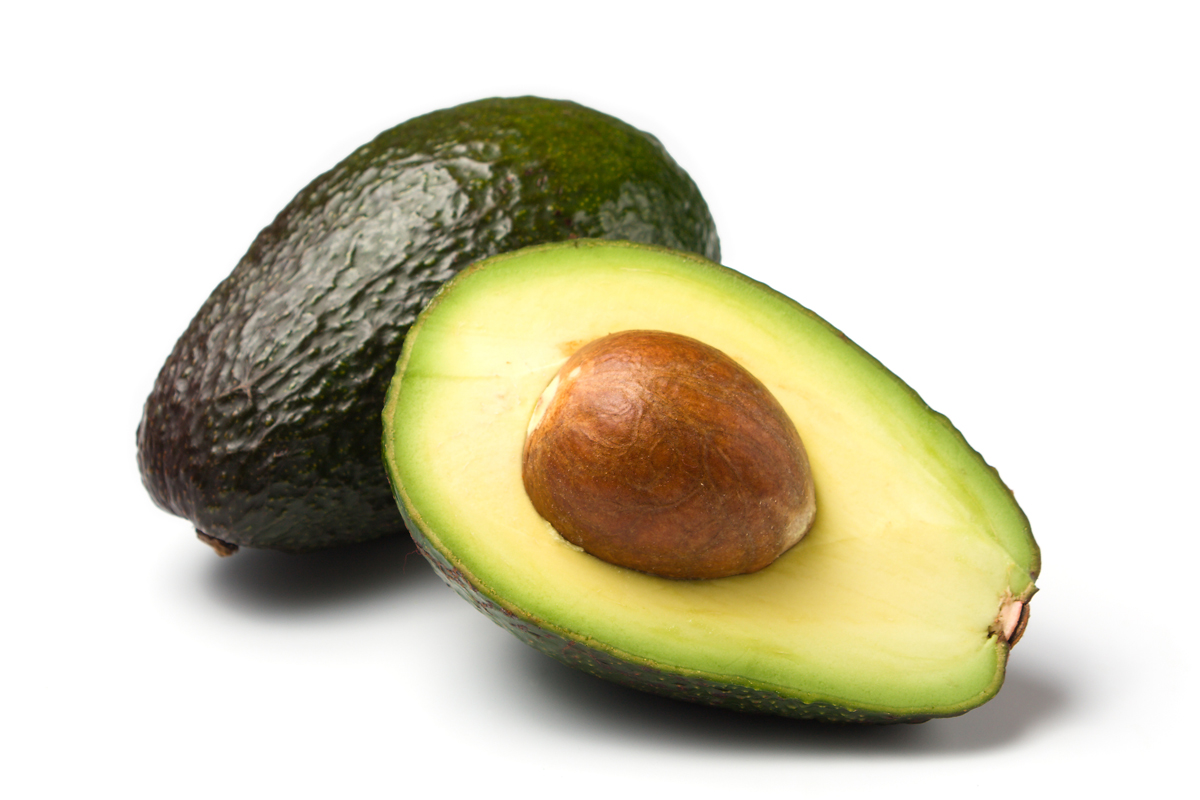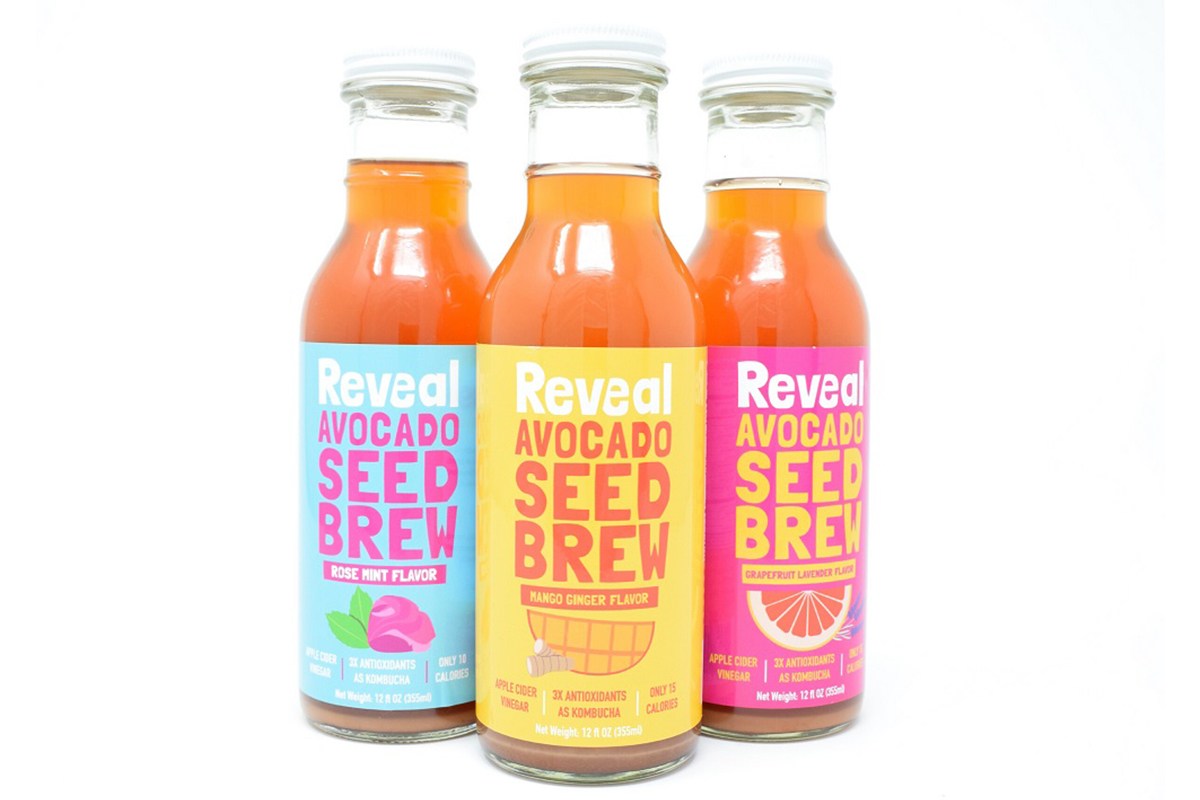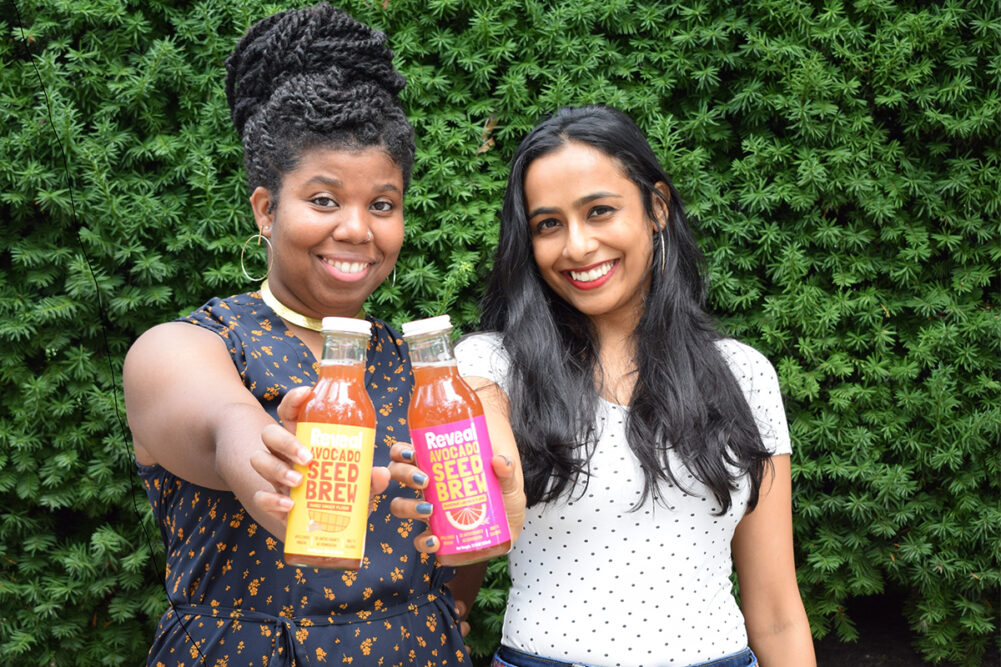PHILADELPHIA — A couple of years ago a curious graduate student on a quest to reduce food waste began experimenting with avocado seeds.
The non-compostable byproduct of a millennial obsession contributes millions of pounds of waste each week in the United States, and yet, as Sheetal Bahirat discovered, the pits hold potential health benefits.
The insights led Ms. Bahirat and fellow graduate student Zuri Masud to develop Reveal, a ready-to-drink beverage brand capturing the nutritional properties of avocado seeds while diverting them from landfills. In mid-August, the startup celebrated its market debut in Philadelphia through a partnership with food delivery platform goPuff.
Avocado seed brew is the first product from Hidden Gems Beverage Co. The drink contains apple cider vinegar and is lightly sweetened with monk fruit. Flavors include rose mint, mango ginger and grapefruit lavender.
“There are lots of things we can do with the avocado seed, … and we can potentially do a lot of things with the peel, considering these are all very high in antioxidants,” Ms. Bahirat said. “We also have a whole entire world of food waste we can tackle. We can do things with mango pits, pineapple skins and leaves that no one is doing anything about.”

A fruitful discovery
The avocado seed brew was born in the Drexel Food Lab, a food product development and culinary innovation center at Philadelphia-based Drexel University, where Jonathan Deutsch, PhD, teaches a philosophy of culinary improvisation, encouraging his students to experiment and fail without penalty.
“I feel really strongly that if you know the outcome of the experiment before you start it, you’re not really teaching research; you’re teaching how to use the lab equipment,” said Dr. Deustch, a research chef and culinary arts professor. “I have colleagues who teach culinary classes by handing out recipes and encouraging students to follow the recipe and get the result exactly as intended. That’s definitely a good way to master fundamental cooking skills, but… somewhere in every culinary or food science program there has to be that opportunity to try things, make mistakes and take risks.”
Launched in 2014, Drexel Food Lab engages students to develop market-
driven products that are desirable to consumers and improve the food system. The lab’s clients range from student-led startups to multinational companies like McCormick & Co., Bimbo Bakeries USA and the Hain Celestial Group. As Ms. Masud pursued her master’s degree in food science, she and other classmates collaborated with the Hershey Co. to research and develop snack products. Through a project with foodservice provider Aramark Corp., she conducted market research and created vegan and vegetarian menu items for college dining halls.
“The idea of having college students collaborate with corporate chefs from Aramark on plant-forward items was a great way to say to clients, ‘We not only understand who your market is; these ideas came out of students who are in your market,’” Dr. Deutsch said. “It was really innovative compared to hiring a chef and saying, ‘We need 20 new menu ideas.’ That chef could be the most talented person in the world, but no chef is more creative than putting 10 or 12 students together in a room and letting them generate ideas.”
In the food industry, innovation is a buzzword that often is overused or misapplied to product line extensions, new flavors or packaging, and formulation updates, Dr. Deustch said. The Drexel Food Lab focuses on cooking as the root of innovation, demonstrating true innovation can be uncomplicated, no frills even.
“The avocado seed brew is a perfect example,” Dr. Deustch said. “It can’t really be more low-tech. They take the avocado seeds and steep them and make a brew, which, from a technical standpoint, is as easy as making tea.”

Scale up and hunker down
Months of iterating and hundreds of consumer taste tests proved Ms. Bahirat and Ms. Masud had created a viable product concept. The pair received support from the Baiada Institute for Entrepreneurship at Drexel University and the food innovation accelerator Food-X to build the business. But the path forward was not without hurdles.
“When we started out, we didn’t know if this brew was safe for human consumption,” Ms. Bahirat said. “We had to hire experts to go through toxicology tests to make sure there was nothing we missed. We had to do all of that before anyone would even talk to us, which is a lot for grad students who don’t have a lot of money.”
Another challenge involved securing supply of avocado seeds. The two founders called a number of area restaurants and asked chefs to stash pits in a freezer instead of tossing them in the trash.
“We talked to a lot of people that were professionals in this field, and we also paid a lot of money to people who basically told us we’d never be able to scale this up,” Ms. Bahirat recalled.
Dr. Deustch steered the founders to the Food Innovation Center at Rutgers University. The center is staffed by nearly a dozen industry veterans providing food safety, product design and scale-up expertise to early-stage entrepreneurs and food companies. A recent client was Impossible Foods, the well-funded producer of plant-based burger patties.
“What we bring to entrepreneurs who may have a concept is some of the more practical reality of, how are you actually going to commercialize this?” said Julie Elmer, associate director of food technology. “There’s a lot of practical things that don’t occur to you when you’re making one small prototype. How is that process going to go? What are the costs going to be? What’s the shelf life going to be like? How is the flavor going to stand up over time?
“There’s just a million questions that may not even occur to them at this stage.”
The pandemic and subsequent economic downturn have brought many first-time entrepreneurs through the doors of the Food Innovation Center as some rethink careers or find more free time to pursue business ideas.
“Many people we see really think they know food,” said Diane Holtaway, associate director of marketing and business development. “Loving and eating food is very different than running a successful food business.”
Nolan Lewin, acting executive director and director of operations, added, “I can’t tell you how many people have a tomato sauce or spaghetti sauce or hot sauce or barbecue sauce recipe … ‘What makes your product stand out?’ I always ask that of clients who come in with a pretty common item…
“I would say probably 2 or 3 out of 10 I might gently persuade not to pursue a particular item and tell them to go back to the drawing board or come up with a different concept, and occasionally they do.”
The Food Innovation Center offers a food business basics course spanning such topics as product strategy and development, packaging, food safety regulations and food law. The experience is often a make-or-break moment for aspiring entrepreneurs, Ms. Holtaway said.
“When it gets to the food safety piece, you can see the eyes glaze over, and it’s like, ‘This may not be for me,’” she said.
Many emerge from the class energized and undaunted, Ms. Elmer said. Experienced food professionals are all too familiar with the hurdles of a complex industry, but startup founders tend to be fearless, she said.
“That has been the case with Zuri and Sheetal,” Ms. Elmer said. “Even the timing of the pandemic has really not slowed down their enthusiasm. They’re just trying to be creative in how they would distribute in this new world. I think they have those characteristics that successful entrepreneurs need.”
The release of Reveal initially was slated for this past spring, but the onset of the pandemic delayed the introduction.
“We’ve helped them with the fine-tuning of the final product, getting formulas put together, figuring out how we’re going to begin the initial scaling, and we’re still in the process of doing that,” Ms. Elmer said.
Another consequence of the pandemic, she said, was a smaller supply of avocado seeds since many restaurants have shuttered temporarily. The founders are working to partner with guacamole manufacturers to source the key ingredient for the beverages.
Ms. Bahirat and Ms. Masud are planning a focused rollout for Reveal, beginning in the local community and strategically expanding and refining over time.
“The idea is to get everyone in Philly to know who we are and then to tinker and experiment with online advertising and direct-to-consumer to test our messaging and see what people are gravitating toward,” Ms. Bahirat said. “So by the time this pandemic, we’re hoping, comes to an end next year, we will be ready to go into retail.”
Consumers increasingly are embracing the idea of upcycled ingredients as many new brands enter the market with products featuring spent brewer’s grains, cacao fruit, salmon skins and more. The Upcycled Food Association estimates there are currently 400 upcycled products in the US marketplace and is developing a certification seal that may be displayed on product packaging.
In his classes, Dr. Deustch pioneered the concept of mindful cooking, inspiring students to consider the culinary possibilities of waste.
“I like to say it’s like a mini Big Bang when you stop to think, ‘What else can I do with this?’” Ms. Bahirat said. “It opens up this whole world of possibilities you didn’t even know existed.”
Following the processing of the avocado seed beverages, what remains of the pits are brittle and compostable, Ms. Masud said.
“We found a local composter we can use that’s about a mile away from the manufacturing facility,” she said. “So we are able to compost the seeds when we’re done.”





